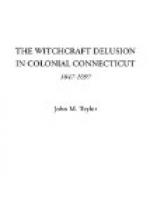“4. As in complaints upon witchcraft there may be matters of inquiry which do not amount unto matters of presumption, and there may be matters of presumption which yet may not be matters of conviction, so it is necessary that all proceedings thereabout be managed with an exceeding tenderness toward those that may be complained of, especially if they have been persons formerly of an unblemished reputation.
“5. When the first inquiry is made into the circumstances of such as may lie under the just suspicion of witchcrafts, we could wish that there may be admitted as little as possible of such noise, company and openness as may too hastily expose them that are examined, and that there may be nothing used as a test for the trial of the suspected, the lawfulness whereof may be doubted by the people of God, but that the directions given by such judicious writers as Perkins and Barnard may be observed.
“6. Presumptions whereupon persons may be committed, and much more, convictions whereupon persons may be condemned as guilty of witchcrafts, ought certainly to be more considerable than barely the accused persons being represented by a spectre unto the afflicted, inasmuch as it is an undoubted and notorious thing that a demon may by God’s permission appear even to ill purposes, in the shape of an innocent, yea, and a virtuous man. Nor can we esteem alterations made in the sufferers, by a look or touch of the accused, to be an infallible evidence of guilt, but frequently liable to be abused by the devil’s legerdemains.
“7. We know not whether some remarkable affronts given the devils, by our disbelieving these testimonies whose whole force and strength is from them alone, may not put a period unto the progress of the dreadful calamity begun upon us, in the accusation of so many persons whereof some, we hope, are yet clear from the great transgression laid to their charge.
“8. Nevertheless, we cannot but humbly recommend unto the government, the speedy and vigorous prosecutions of such as have rendered themselves obnoxious, according to the directions given in the laws of God and the wholesome statutes of the English nation for the detection of witchcrafts.”
[Footnote E: An illustration: The child Ann Putnam, in her testimony against the Rev. Mr. Burroughs, said that one evening the apparition of a minister came to her and asked her to write her name in the devil’s book. Then came the forms of two women in winding sheets, and looked angrily upon the minister and scolded him until he was fain to vanish away. Then the women told Ann that they were the ghosts of Mr. Burroughs’ first and second wives whom he had murdered.]
Did Longfellow, after a critical study of the original evidence and records, truly interpret Mather’s views, in his dialogue with Hathorne?
MATHER:
“Remember this, That
as a sparrow falls not to the ground
Without the will of
God, so not a Devil
Can come down from the
air without his leave.
We must inquire.”




